Full Text Searchable PDF User Manual
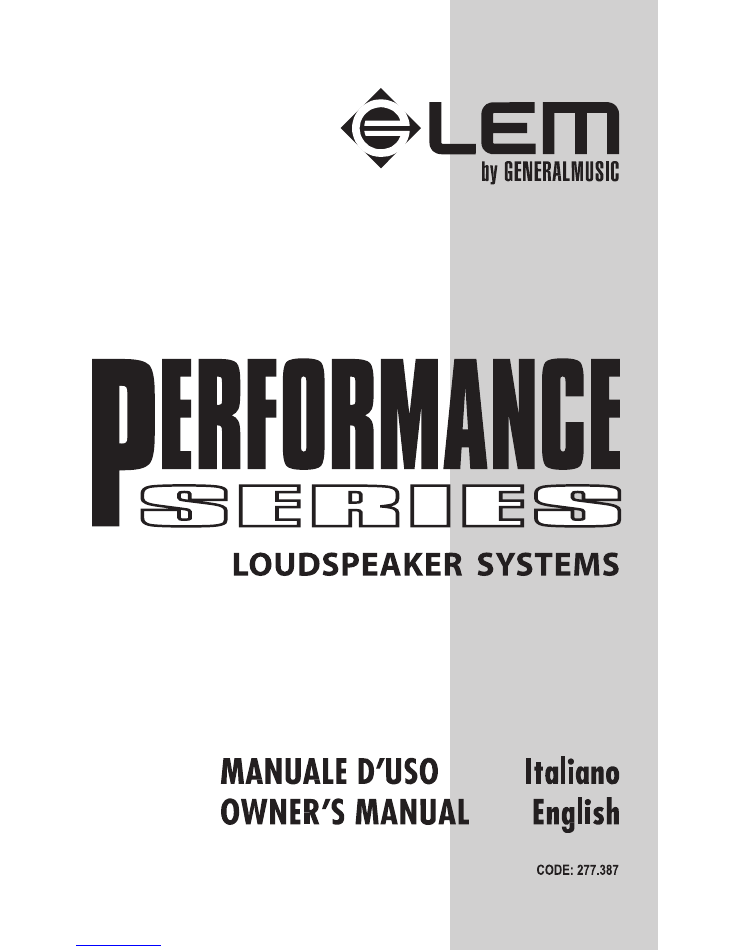

IMPORTANT SAFETY INSTRUCTIONS
INSTRUCTIONS PERTAINING TO A RISK OF FIRE, ELECTRIC SHOCK OR INJURY TO PERSONS
WARNING
- When using electric products, basic precautions should always be followed, including
the following:
1.
Read all the SAFETY INSTRUCTIONS before using the product.
2.
To reduce the risk of injury, close supervision is necessary when the product is used near children.
3.
Do not use this product near water - for example, near a bathtub, washbowl, kitchen sink, in a wet
basement or near a swimming poor or the like.
4.
This product in combination with headphones or an amplifier, may be capable of producing sound
levels that could cause permanent hearing loss. Do not operate for a long period of time at high volume
level or at a level that is uncomfortable. If you experience any hearing loss or ringing in the ears, you
should consult an audiologist.
5.
This product should be located so that its location or position does not interfere with its proper
ventilation.
6.
This product should be located away from heat sources such as radiators, heat registers or other
products that produce heat.
7.
The product should be connected to a power supply only of the type described on the operating
instructions or as marked on the product.
8.
This product may be equipped with a polarized line plug (one blade wider than the other). This is a
safety feature. If you are unable to insert the plug into the outlet, contact an electrician to replace
your obsolete outlet. Do not defeat the safety purpose of the plug.
9.
The power-supply cord of the product should be unplugged from the outlet when left unused for a
long period of time. When unplugging the power-supply cord, do not pull on the cord, but grasp it by
the plug.
10.
Care should be taken so that object do not fall and liquid are not spilled into the enclosure through
openings.
11.
The product should be serviced by qualified service personnel when:
A.
The power-supply cord or the plug has been damaged; or
B.
Objects have fallen, or liquid has been spilled into the product; or
C.
The product has been exposed to rain; or
D.
The product does not appear to operate normally or exhibits a marked change in performance; or
E.
The product has been dropped or the enclosure damaged.
12.
Do not attempt to service the product beyond that described in the user-maintenance instructions.
All other servicing should be referred to qualified service personnel.
13. WARNING
- Do not place objects on the product's power cord or place it in a position where anyone
could trip over, walk on or roll anything over it. Do not allow the product to rest on or to be installed
over power cords of any type. Improper installations of this type create the possibility of fire hazard
and/or personal injury.
SAVE THESE INSTRUCTIONS
The lightning flash with arrowhead symbol within an
equilateral triangle is intended to alert the user to the
presence of uninsulated "dangerous voltage" within the
product's enclosure, that may be of sufficient magnitude to
constitute a risk of electric shock to persons.
The exclamation point within an equilateral triangle is
intended to alert the user to the presence of important
operating and maintenance (servicing) instructions in the
literature accompanying the appliance.

3
1. Introduzione
Congratulazioni per l'acquisto dei diffusori
PERFORMANCE
!
Per un impiego corretto dei diffusori seguite le istruzioni
riportate in questo manuale. Buon divertimento e buon
lavoro.
2. Norme di Installazione e Uso
1. La protezione e la manutenzione.
Evitate di vesporre collocare i diffusori in vicinanza di
forti fonti di calore e di esporli direttamente alla luce
solare, alla pioggia, all’umidità, alla polvere o ad intense
vibrazioni. Lasciate l’apposita griglia di protezione
sempre applicata al diffusore. In caso di avaria non
aprite il diffusore, ma rivolgetevi al più vicino Centro di
Assistenza GENERALMUSIC.
2. Prevenzione di possibili disturbi.
Collegando gli apparati del vostro impianto audio,
ponete molta attenzione ai cosiddetti “loop di massa”
che potrebbero causare ronzii: in caso di disturbi,
provate ad agire sullo switch
EARTH LIFT/SHIELD
posto sul pannello controlli del diffusore.
3. Collegamenti
Prima di collegare il diffusore alla presa della corrente,
accertatevi che la tensione di rete corrisponda a quella
indicata sul retro dell’apparato (è accettata una
tolleranza fino a ±10%). Collegate il cavo di
alimentazione al diffusore sempre prima di accenderlo
e rimuovete il cavo sempre dopo aver spento il
diffusore.Per evitare pericolosi picchi di segnale
effettuate i collegamenti con altri apparati sempre a
diffusore spento e accendete sempre prima il mixer e
poi il diffusore.
4. I cavi di collegamento (fig. 4)
Per il collegamento di casse amplificate al mixer
accertatevi di utilizzare sempre e solo cavi di segnale
schermati costituiti da due fili più una calza che funge
da schermo. L’utilizzo di cavi non schermati potrebbe
determinare l’insorgere di fastidiosi ronzii e rumori di
fondo. Per il collegamento di casse passive
all’amplificatore di potenza accertatevi di utilizzare
sempre e solo cavi di potenza costituiti solo da due fili
di uguale sezione. L’utilizzo di cavi di segnale potrebbe
determinare un’eccessiva dispersione di potenza.
Verificate periodicamente che i cavi impiegati siano in
buono stato, con le connessioni realizzate nel modo
corretto e con tutti i contatti in perfetta efficienza, in
modo da evitare inconvenienti come falsi contatti,
rumori di massa, scariche, ecc.
3. Pannello connessioni (fig. 2)
1. Connettori XLR + JACK collegati in parallelo
(LINK) per l’ingresso ed il rilancio del segnale.
2. Connettori STEREO XLR-F + JACK collegati in
parallelo (LINK) per l’ingresso ed il rilancio del
segnale (solo PFM15SA e PFM18SA).
3. Connettori STEREO XLR-M + JACK collegati in
parallelo (LINK) per il collegamento dei satelliti
(solo PFM15SA e PFM18SA).
4. Controllo per la selezione della frequenza di taglio
del crossover interno da 80 a 320Hz (solo
PFM15SA e PFM18SA) .
5. LED SIGNAL/COMP (solo su PFM15SA e
PFM18SA): segnala la presenza di segnale
(VERDE) o l’intervento del compressore (ROSSO).
6. Controllo di livello del segnale inviato
all’amplificatore interno.
7. Controllo di separazione della massa elettrica
dalla massa del telaio.
8. Interruttore di accensione/spegnimento con LED di
segnalazione.
9. Presa per il cavo di alimentazione.
10. Ingresso di potenza JACK 1/4”.
11. Rilancio di potenza JACK 1/4” per il collegamento
di due diffusori (solo nei modelli con impedenza a
8 ohms).
12. Uscita di potenza JACK 1/4” con taglio di
crossover a 200Hz per il collegamento del satellite
al sub-woofer (solo PFM15S e PFM18S).
4. Collegamenti PFM15SA e PFM18SA (fig. 3)
PFM15SA e PFM18SA possiedono due uscite
bilanciate LEFT & RIGHT per il collegamento ai satelliti
sia in configurazione MONO che in configurazione
STEREO. Queste uscite inviano all’esterno il segnale
filtrato dal CROSSOVER ATTIVO.
1. Configurazione STEREO
Collegate l’uscita RIGHT (destra) del mixer all’ingresso
RIGHT del sub-woofer e l’uscita RIGHT del sub-woofer
all’ingresso della cassa amplificata DESTRA.Collegate
l’uscita LEFT (sinistra) del mixer all’ingresso LEFT del
sub-woofer e l’uscita LEFT del sub-woofer all’ingresso
della cassa amplificata SINISTRA.
2. Configurazione MONO
Collegate l’uscita DESTRA del mixer ad uno dei due
ingressi (LEFT o RIGHT) del sub-woofer DESTRO e
l’uscita corrispondente del sub-woofer all’ingresso della
cassa amplificata di DESTRA. Collegate l’uscita
SINISTRA del mixer ad uno dei due ingressi (LEFT o
RIGHT) del sub-woofer SINISTRO e l’uscita
corrispondente del sub-woofer all’ingresso della cassa
amplificata di SINISTRA.
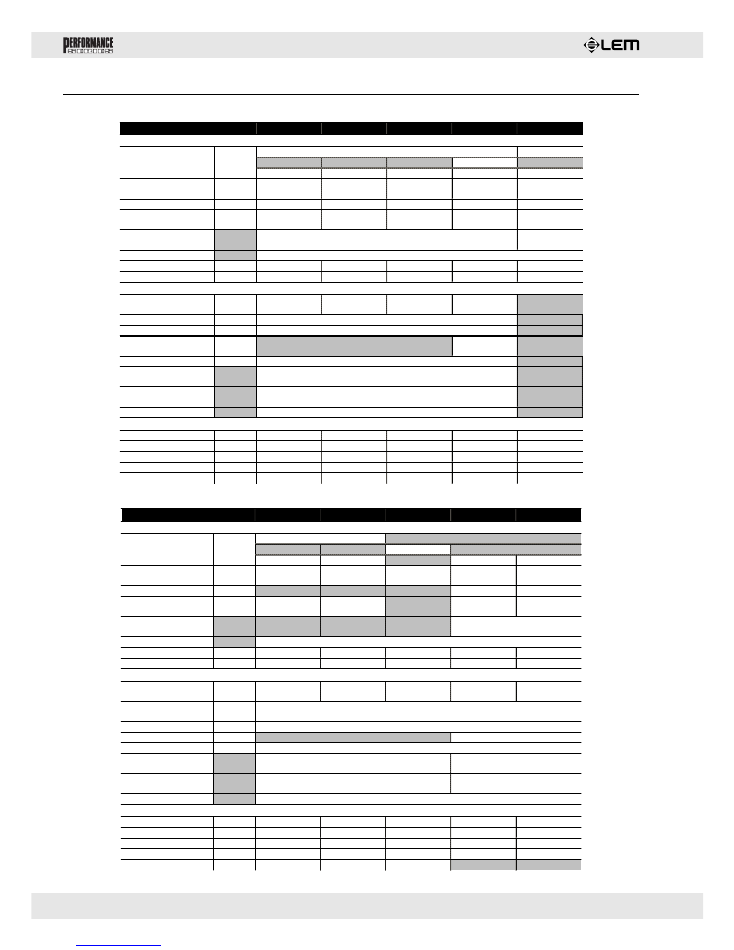
4
5. Specifiche tecniche
PFM 12.2MA
PFM 15.2MA
PFM 8MA
PFM 15S
PFM 18S
Alti
Medi
Widerange da 8"
Bassi
Woofer da 12"
Woofer da 15"
Woofer da 15"
Woofer da 18"
POTENZA APPLICABILE
(EIA RS-426A)
W continui
W picco
150
200
250
500
100
200
350
700
350
700
IMPEDENZA
Ohms
4
4
CROSSOVER PASSIVO
Hz
5 kHz
6 dB/oct.
4000 @ 6 dB/oct.
230 Hz
12 / 6 dB/oct.
120 Hz
6 / 6 dB/oct.
CONNESSIONI (versioni
passive)
COSTRUZIONE
DIMENSIONI
mm (LxAxP)
390x508x325
450x572x400
305x395x275
478x508x478
630x540x550
PESO (passive / attive)
kg
15
21,5
11.5
19.5 / 24.5
28.5 / 35
POTENZA D'USCITA EIA
(1kHz, max THD 1%)
W
150
250
100
350
350
SENSIBILITA' di INGRESSO
dB (V)
IMPEDENZA di INGRESSO
kohms
CROSSOVER ATTIVO
Hz
DISTORSIONE
%
CONTROLLI
CONNESSIONI
ALIMENTAZIONE
SENSIBILITA' (SPL 1W/1m)
dB
97
98
95
94
96
MAX SPL continua
dB
116
119
114
118
120
MAX SPL di picco
dB
119
122
117
121
123
RISPOSTA in FREQUENZA
Hz (-10dB)
55 - 20k
48 - 20k
65 - 20k
40 - 300
40-200
DISPERSIONE (OxV)
°
90 x 60
90 x 60
90 x 90
SPECIFICHE del SISTEMA
0 (0.775V)
2 x JACK (input + link)
JACK + XLR-F (in)
JACK + XLR-M (out)
Vedi targhetta informativa sull'apparato
Volume
30 (bilanciato) - 15 (sbilanciato)
Da 80 a 320 @ 12dB/ott.
<0.02 (THD+Noise)
Volume - Shield on/off
XOVER frequency
SPECIFICHE del DIFFUSORE
3 x JACK
(input + link + out)
SPECIFICHE dell'AMPLIFICATORE (versioni attive)
COMPONENTI
Tweeter a tromba al Niobium
PFM 10.2
PFM 12.2
PFM 15.2
PFM 15.3
PFM 15.3XL
Alti
Driver da 1" EWT™
Medi
Midrange da 6"
Bassi
Woofer da 10"
Woofer da 12"
Woofer da 15"
Woofer da 15"
2 x Woofer da 15"
POTENZA APPLICABILE
(EIA RS-426A)
W continui
W picco
100
200
150
300
250
500
250
500
500
1000
IMPEDENZA
Ohms
8
8
4 / 8
4 / 8
4
CROSSOVER PASSIVO
Hz
5 kHz
6 dB/oct.
5 kHz
6 dB/oct.
4 kHz
6 dB/oct.
0.8/ 5 kHz
12 / 6 dB/oct.
400 @ 6dB/ott.
2600 @ 12-18dB/ott.
CONNESSIONI (versioni
passive)
2 x SPEAKON
(input + link)
COSTRUZIONE
DIMENSIONI
mm (LxAxP)
340x458x285
390x508x325
458x578x405
482x608x405
477x1052x430
PESO (passive / attive)
kg
9 / 12
11.5 / 15.5
16.5 / 21.5
19.5 / 24.5
27
POTENZA D'USCITA EIA
(1kHz, max THD 1%)
W
100
150
250
250 + 80
SENSIBILITA' di INGRESSO
dB (V)
IMPEDENZA di INGRESSO
kohms
CROSSOVER ATTIVO
Hz
2 kHz
18 dB/oct.
DISTORSIONE
%
CONTROLLI
CONNESSIONI
ALIMENTAZIONE
SENSIBILITA' (SPL 1W/1m)
dB
96
97
98
98
99
MAX SPL continua
dB
113
116
119
121
123
MAX SPL di picco
dB
116
119
122
127
126
RISPOSTA in FREQUENZA
Hz (-10dB)
60 - 20k
55 - 20k
48 - 20k
45 - 20k
46 - 17K
DISPERSIONE (OxV)
°
90 x 60
90 x 60
90 x 60
90 x 60
60 x 40
SPECIFICHE del DIFFUSORE
0 (0.775V)
Truciolare ricoperto di moquette blu.
SPECIFICHE dell'AMPLIFICATORE (versioni attive)
2 x JACK (input + link)
Vedi targhetta informativa sull'apparato.
SPECIFICHE del SISTEMA
COMPONENTI
2 x JACK (input + link)
Tweeter a tromba al Niobium
30 (bilanciato) - 15 (sbilanciato)
<0.02 (THD+Noise)
Volume

5
1. Introduction
Congratulations for having chosen
PERFORMANCE
loudspeaker systems!
To make the best use of the PERFORMANCE systems,
please read this manual thoroughly before operating the
equipment.
2. Instructions for use and installation
1. Protection and maintenance.
To avoid jeopardizing correct operation, it is best not
to position the enclosure for long periods in exposed
places (damp, high temperature, etc.), in dusty
environments or those subject to strong vibrations. On
this subject, it’s advisable to always leave the protective
grille mounted on the enclosure. In the event of
breakdown, do not open the enclosure, but contact the
nearest GENERALMUSIC Service Centre.
2. Prevention of possible interference.
Avoid installing your equipment in the vicinity of radios,
televisions, etc., since this could cause noisy
disturbance. When connecting other equipment to your
sound system, pay close attention to so-called earth-
loops, which can cause hum: in the event of
interference, try using the
EARTH LIFT/SHIELD
switch
on the enclosure’s control panel.
3. Connections.
Before connecting the enclosure to the mains supply,
make certain that the current corresponds with that
indicated on the rear of the unit (there is an allowance
of ±10%). Always connect the power cable to the
enclosure before switching on the enclosure and always
remove it after having switched off. Remember to
always connect or disconnect other equipment with the
enclosure off and to always switch on the mixer first,
then the enclosure: in this manner, annoying and often
dangerous peaks are avoided.
4. Connector cables (fig. 4).
When connecting amplified enclosures to the mixer,
make certain to always use only screened signal cables
made up of two wires plus a braid/screen: the use of
unscreened cables could in fact probably cause
annoying hum and noise. When connecting passive
enclosures to the power amplifier, make certain to
always use only power cables made up of just two wires
with the same cross-section: the use of signal cables
could cause an excessive loss of power. Check
periodically that your cables are in good condition,
correctly wired and with perfectly efficient contacts: in
fact many problems and drawbacks (false contacts,
ground hum, crackles, etc.) are caused by the use of
unsuitable or damaged cables.
3. Connection panel (fig. 2)
1. XLR-F + JACK sockets connected in parallel for
the signal input and linking.
2. XLR-F + JACK sockets connected in parallel for
the signal input and linking (only PFM15SA and
PFM18SA).
3. XLR-M + JACK sockets connected in parallel for
the connection of the satellites (only PFM15SA
and PFM18SA).
4. Control for selecting the crossover frequency from
a 80Hz to 320Hz (only PFM15SA and PFM18SA).
5. SIGN/COMP LED (only PFM15SA and PFM18SA):
show the presence of a signal with minimum level
-26dB (green color) or the built-in compressor
operating (red color).
6. Control of the signal level sent to the built-in
amplifier.
7. Control for separating the electrical earth from that
of the chassis.
8. ON/OFF switch with LED indicator.
9. Power supply socket.
10. JACK 1/4” power input.
11. 1/4” JACK power output for the linking of two
loudspeaker systems in series (only in the 8-Ohm
versions).
10. 1/4” JACK output power with 230 Hz
CROSSOVER for the connection of the satellite to
the sub-woofer (only PFM15S and PFM18S).
4. PFM15SA and PFM18SA connections (fig. 3)
PFM15SA and PFM18SA have two balanced LEFT &
RIGHT outputs to enable the use of the system in
STEREO or MONO. These outputs feed out the signal
coming from the ACTIVE CROSSOVER.
1. STEREO configuration
Connect the mixer’s RIGHT output to the sub-woofer’s
RIGHT input and the sub-woofer’s RIGHT output to the
RIGHT input of the RIGHT amplified enclosure. Connect
the mixer’s LEFT output to the sub-woofer’s LEFT input
and the sub-woofer’s LEFT output to the LEFT input of
the LEFT amplified enclosure.
2. MONO configuration
Connect the mixer’s RIGHT output to one of the two
inputs (LEFT or RIGHT) of the RIGHT-HAND sub-
woofer and the corresponding sub-woofer output to the
input of the RIGHT-HAND amplified enclosure. Connect
the mixer’s LEFT output to one of the two inputs (LEFT
or RIGHT) of the LEFT-HAND sub-woofer and the
corresponding sub-woofer output to the input of the
LEFT-HAND amplified enclosure.
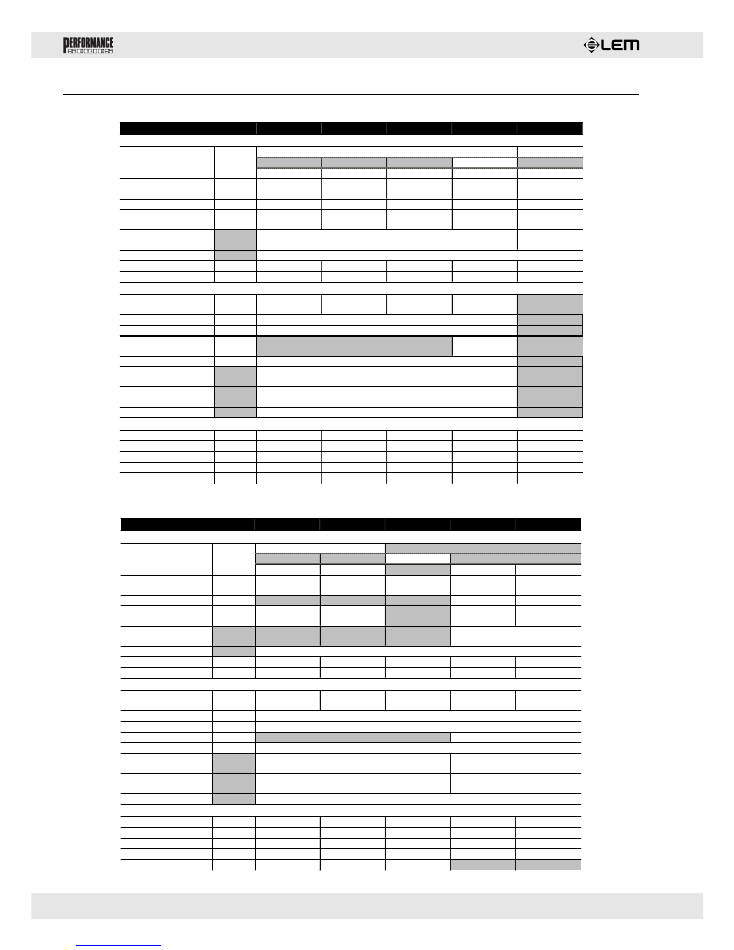
6
PFM 10.2
PFM 12.2
PFM 15.2
PFM 15.3
PFM 15.3XL
High
1" EWT™ driver
Mid
6" midrange
Low
10" woofer
12" woofer
15" woofer
15" woofer
2 x 15" Woofer
POWER HANDLING
(EIA RS-426A)
W continuous
W peak
100
200
150
300
250
500
250
500
500
1000
IMPEDANCE
Ohms
8
8
4 / 8
4 / 8
4
PASSIVE CROSSOVER
Hz
5 kHz
6 dB/oct.
5 kHz
6 dB/oct.
4 kHz
6 dB/oct.
0.8/ 5 kHz
12 / 6 dB/oct.
400 @ 6dB/ott.
2600 @ 12-18dB/ott.
CONNECTIONS (passive
versions)
2 x SPEAKON
(input + link)
CONSTRUCTION
DIMENSIONS
mm (WxHxD)
340x458x285
390x508x325
458x578x405
482x608x405
477x1052x430
WEIGHT (passive / active)
kg
9 / 12
11.5 / 15.5
16.5 / 21.5
19.5 / 24.5
27
EIA OUTPUT POWER
(1kHz, max THD 1%)
W
100
150
250
250 + 80
INPUT SENSITIVITY
dB (V)
INPUT IMPEDANCE
kohms
ACTIVE CROSSOVER
Hz
2 kHz
18 dB/oct.
DISTORSION
%
CONTROLS
CONNECTIONS
POWER SUPPLY
SENSITIVITY (SPL 1W/1m)
dB
96
97
98
98
99
MAX SPL continuous
dB
113
116
119
121
123
MAX SPL peak
dB
116
119
122
127
126
FREQUENCY RESPONSE
Hz (-10dB)
60 - 20k
55 - 20k
48 - 20k
45 - 20k
46 - 17K
DISPERSION (OxV)
°
90 x 60
90 x 60
90 x 60
90 x 60
60 x 40
<0.02 (THD+Noise)
30 (balanced) - 15 (unbalanced)
SYSTEM SPECIFICATIONS
COMPONENTS
2 x JACK (input + link)
See label on the apparatus
2 x JACK (input + link)
Volume
0 (0.775V)
Niobium horn tweeter
LOUDSPEAKER SPECIFICATIONS
AMPLIFIER SPECIFICATIONS (active versions)
Chipboard covered with blue carpet
PFM 12.2MA
PFM 15.2MA
PFM 8MA
PFM 15S
PFM 18S
High
Mid
8" widerange
Low
12" woofer
15" Woofer
15" woofer
18" woofer
POWER HANDLING
(EIA RS-426A)
W continuous
W peak
150
200
250
500
100
200
350
700
350
700
IMPEDANCE
Ohms
8
8
PASSIVE CROSSOVER
Hz
5 kHz
6 dB/oct.
4000
6 dB/oct.
230 Hz
12 / 6 dB/oct.
120 Hz
6 / 6 dB/oct.
CONNECTIONS (passive
versions)
CONSTRUCTION
DIMENSIONS
mm (WxHxD)
390x508x325
450x572x400
305x395x275
478x508x478
630x540x550
WEIGHT (passive / active)
kg
15
21,5
11.5
19.5 / 24.5
28.5 / 35
EIA OUTPUT POWER
(1kHz, max THD 1%)
W
150
250
100
350
350
INPUT SENSITIVITY
dB (V)
INPUT IMPEDANCE
kohms
ACTIVE CROSSOVER
Hz
DISTORSION
%
CONTROLS
CONNECTIONS
POWER SUPPLY
SENSITIVITY (SPL 1W/1m)
dB
97
98
95
94
96
MAX SPL continuous
dB
116
119
114
118
120
MAX SPL peak
dB
119
122
117
121
123
FREQUENCY RESPONSE
Hz (-10dB)
55 - 20k
48 - 20k
65 - 20k
40 - 300
40-200
DISPERSION (OxV)
°
90 x 60
90 x 60
90 x 90
SYSTEM SPECIFICATIONS
See label on the apparatus
Volume - Shield on/off XOVER frequency
JACK + XLR-F (in)
JACK + XLR-M (out)
Volume
2 x JACK (input + link)
LOUDSPEAKER SPECIFICATIONS
AMPLIFIER SPECIFICATIONS (active versions)
3 x JACK
(input + link + out)
Niobium horn tweeter
COMPONENTS
0 (0.775V)
<0.02 (THD+Noise)
From 80 to 320
30 (balanced) - 15 (unbalanced)
5. Technical specifications
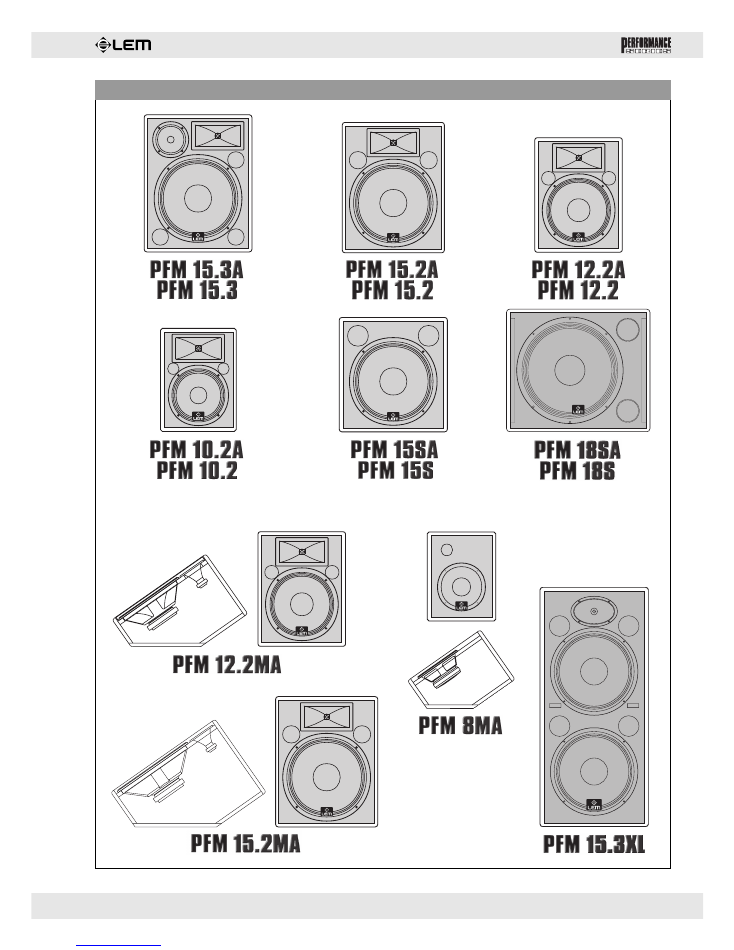
7
FIG. 1 - MODELS
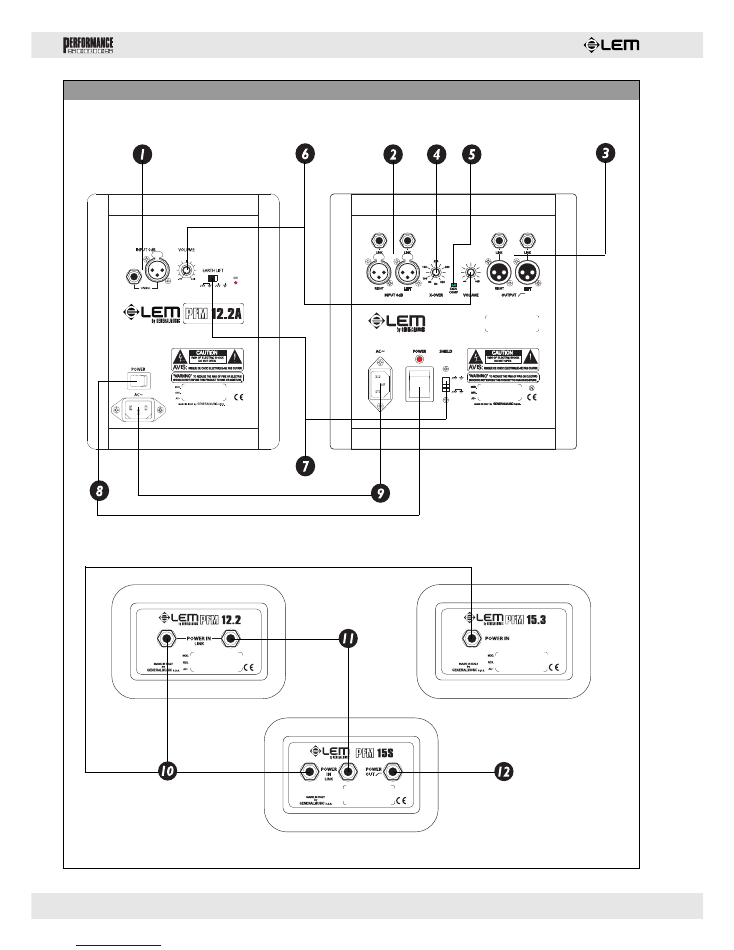
8
FIG. 2 - CONNECTION PANELS
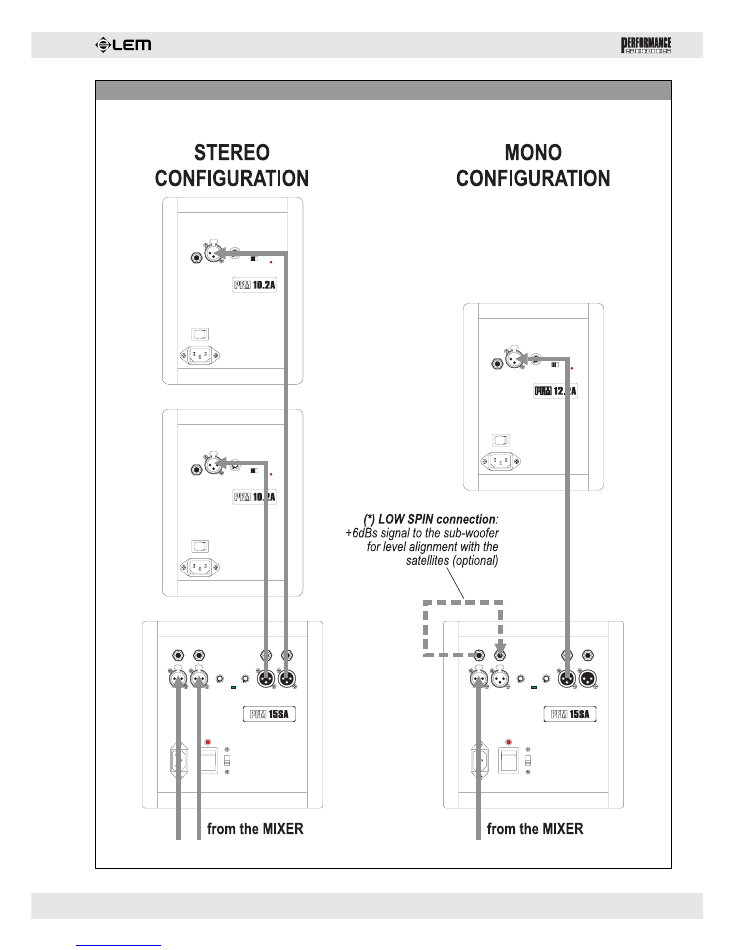
9
FIG. 3 - PFM 15SA & PFM 18SA CONNECTION EXAMPLES
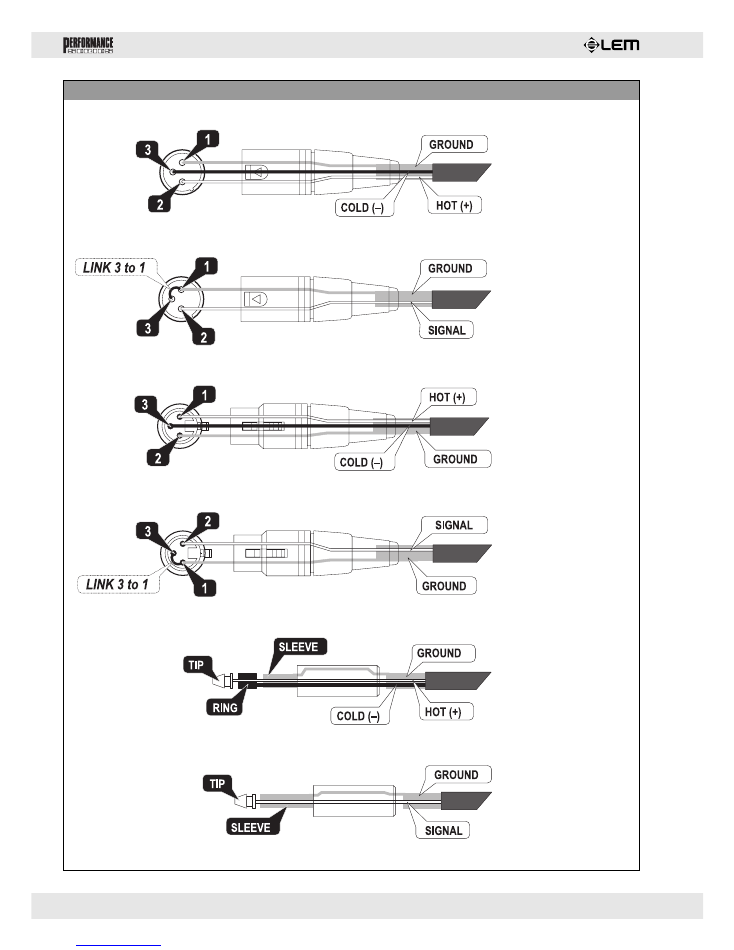
10
FIG. 4 - CONNECTION CABLES
Balanced M-XLR
Unbalanced M-XLR
Balanced F-XLR
Unbalanced F-XLR
Balanced
1/4”JACK
Unbalanced
1/4”JACK

Le informazioni contenute in questo documento sono state attentamente redatte e controllate. Tuttavia
non è assunta alcuna responsabilità per eventuali inesattezze.
Tutti i diritti sono riservati e questo documento non può essere copiato, fotocopiato, riprodotto per intero o
in parte senza previo consenso scritto della
GENERALMUSIC
S.p.A.
GENERALMUSIC
si riserva il diritto di apportare senza preavviso cambiamenti e modifiche estetiche,
funzionali o di design a ciascun proprio prodotto.
GENERALMUSIC
non assume alcuna responsabilità sull’uso o sull’applicazione dei prodotti o dei circuiti
qui descritti.
STAMPATO IN ITALIA
The information contained in this publication has been carefully prepared and checked. However no
responsibility will be taken for any errors.
All rights are reserved and this document cannot be copied, photocopied or reproduced in part or completely
without written consent being obtained in advance from
GENERALMUSIC
S.p.A.
GENERALMUSIC
reserves the right to make any aesthetic, functional or design modification to any of its
products without any prior notice.
GENERALMUSIC
assumes no responsibility for the use or application of the products or circuits described
herein.
PRINTED IN ITALY
FEDERAL COMMUNICATIONS COMMISSION
NOTE:
This equipment has been tested and found to comply with the limits for a Class A digital device,
pursuant to Part 15 of FCC Rules. These limits are designed to provide reasonable protection against
harmful interference when the equipment is operated in a commercial environment. This equipment
generates, uses and can radiate radio frequency energy and, if not installed and used in accordance with
the instruction manual, may cause harmful interference to radio communications. Operations of this
equipment in a residential area is likely to cause harmful interference in which case the user will be required
to correct the interference at his own expense.
CAUTION:
Changes or modifications to this product not expressly approved by the manufacturer could
void the user's authority to operate this product.

Sales Division: 47842 S.Giovanni in Marignano (RN) – Via delle Rose, 12 – tel. +39-0541-959511 – fax +39-0541-957404
Internet: http://www.lemaudio.com